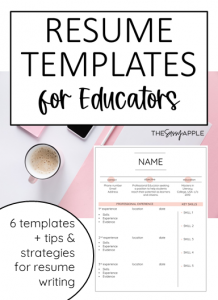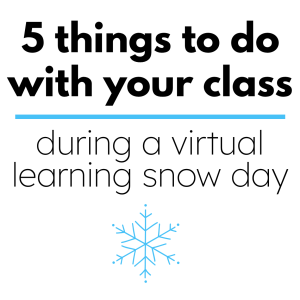Whether you are a recent college grad or looking for a new position, interviewing is nerve-wracking! Here are some tips on how to have the best teaching interview.
I have interviewed a lot. Like, can’t count on all my fingers and toes a lot. And to be honest, I’m not the greatest! (I guess that’s kind of obvious since I’ve had to do it so much). Personally, I get SUPER nervous and due to this, I always regret not sharing more or being more specific.
So why am I here to offer advice? Well, even though I’m not the best at interviewing, I am fully aware of what makes a great interview. And, now, I’ve been on the other side of the table as a part of the interview team.
Honestly, I think that gaining the experience of being an interviewer will positively impact my future interviews. I can identify what makes and breaks an interview and I’m here to share what I know now.
Before you land the interview, districts will be sorting through all the resumes. Make sure yours stands out! Check out resume templates for educators.

Before the Interview
Preparation is KEY.
You can tell who has prepared and who has not.
Research the school district.
How big is the district? How many schools? What is their mission/vision? What are their current initiatives? If you know someone who works in the district, reach out and ask about their experience. The more specific, the better. Knowing the district’s values and having a reason for wanting to work there is crucial. Even if it’s because the school is 5 minutes from your house, you should not use that as your “why”.
Write down your best teaching stories.
Sit down with a list of potential questions and write (or type) your answer for each one. Your answer should include SPECIFIC examples of how you’ve accomplished whatever it is that the question asks about. Think of your classroom experience, stories, learning moments–the good, bad, and the ugly! You can always twist something that went wrong by sharing how you made it right. Keep these fresh in your mind and be ready to connect them to a relevant question. For example, I have a story where I thought outside of the box to reach a student who was refusing to do any work. I like to tie this into questions about classroom management. Topics to think about:
- Family communication: Do you have any positive stories with parents? Look back at notes or emails to refresh your memory.
- Collaboration with colleagues: Think of a time when you worked with your team in planning or executing a learning experience.
- Dealing with difficult parents: How did you handle a parent who was challenging you as a teacher?
- Helping struggling students: What strategies have you used that were successful? How did you know they were successful?
- Data and assessments: How and when have you used assessment and data to drive your instruction?
- Classroom community: In what ways have you facilitated a positive classroom environment?
Sit in front of a mirror and practice.
Or, better yet, record yourself answering the questions. Then, you can watch it back and take notes on what went well and where you need to improve. If you feel comfortable, have someone you know and trust watch the video and give you feedback.
During the Interview
Focus on what excites you.
Show emotion. No interviewer wants to hear dull answers from someone who seems bored. It’s difficult to listen to and docks major points. Put your passion on display. One of the things I have found that helps me bring out genuine emotion is to talk about specific experiences (more on that later).
Don’t be afraid to ask the interviewer to repeat a question.
I would try not to do this too many times but it is better to ask them to repeat than to misunderstand or forget to answer a vital part of the question. It also gives you a moment of thinking time.
If you feel comfortable, take a notebook.
This is a great way to jot a note or two during the question. I was on the interview team and one of the candidates did this. I thought it was a perfect strategy to ensure the questions were being answered thoroughly.
If you have a portfolio, incorporate it into your answers.
Don’t expect the interviewers to ask for your portfolio or take the time to look through it. I have used mine to highlight lessons, student work samples, or resources I’ve created that connect to the question being asked. I have also seen a candidate use it at the end of the interview when asked if they had anything else they’d like to share.
When they end with “Anything else you’d like to share?” Be ready to share something good!
This is your opportunity to stand out. Do not pass it up! If there is anything you didn’t get to share about through answering the questions or something you thought of after the fact, bring it up! Or, just take the time to highlight your top two or three best qualities. Whatever you do, don’t pass up on this question.
Finally, make sure you have questions to ask at the end.
Interviews typically end with “Do you have any questions for us?”. This is another opportunity to stand out. Some great questions include:
- What do you feel are your school’s strongest attributes? What’s something your school is working on progressing?
- How are teachers encouraged to work collaboratively in your district?
- In what ways are new teachers supported and evaluated?
- What opportunities does the district provide for professional development and growth?
- What types of technology are available in each classroom?
- How would you describe the school’s relationship with families and the community?

After the Interview
Follow up after the interview.
After the interview, a mailed thank you note is impressive but there’s not always time to do that. A short and simple email to the interview team is also great. If you can be specific about the school, it will add a touch of personalization. For example,
“Thank you so much for taking the time to meet with me today. I loved learning more about the 1st-grade position and how a culture of collaboration is prioritized at Happy Elementary School. I’m confident my experience teaching 1st grade for the last three years has prepared me for success teaching at your school. Please do not hesitate to contact me in the meantime if you have any further questions. I look forward to hearing from you!”
Reflect.
You’ve put in the hard work. Now take a breath and sit down with a pencil and paper to get your thoughts out. How did you feel it went? Write down some questions you can remember. Jot down notes about things you did well and what you might improve upon next time. This will be helpful to revisit if and when you interview again.
Try to relax.
Congratulations! You did it. Interviewing is not easy! Treat yourself to a mani/pedi or have dinner with a friend. Do something to avoid obsessing over how the interview went. At this point, you’ve done everything in your control and now it’s out of your hands. Worrying about what is going to happen next will not help.
You will be sure to have the best teaching interview with these tips. Would you like to read more about my teaching interview journey? Check out this post!




